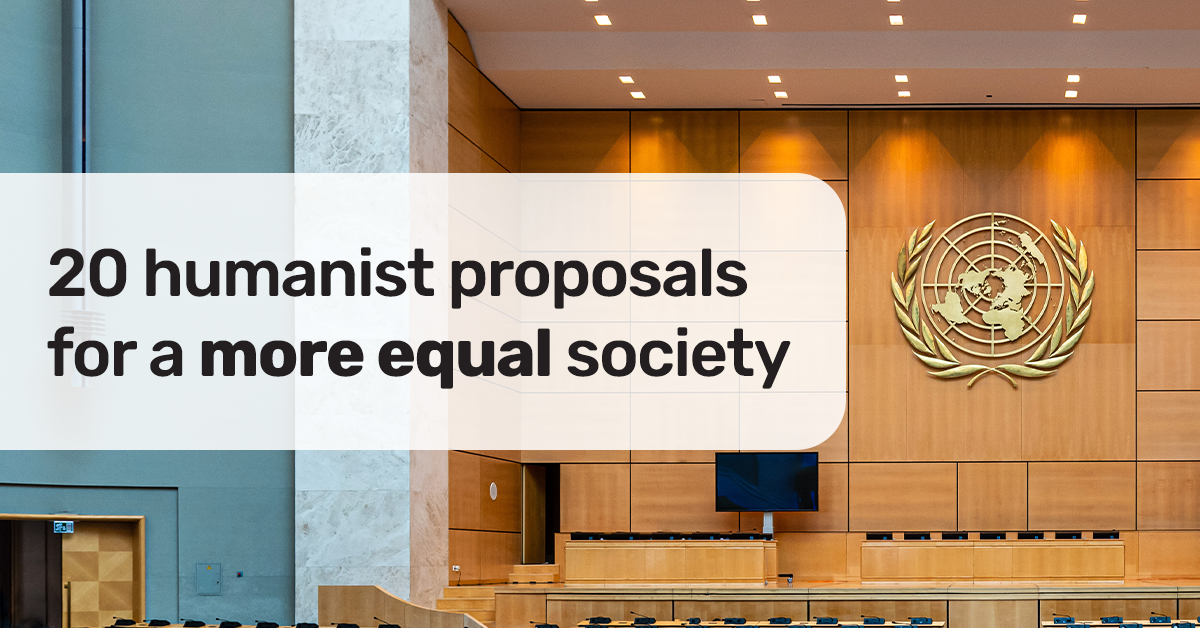
Humanists UK and Humanist Society Scotland have called on the UN Human Rights Committee to address religious discrimination in the UK in its upcoming review of the country’s human rights record.
In a joint submission of evidence, Humanists UK and Humanist Society Scotland raised concerns about discrimination against the non-religious in education, in the criminal justice system and in hate crime law, and made recommendations on how the UK and devolved Parliaments can better uphold the right to freedom of religion or belief for all.
Humanist collaboration at the United Nations
Humanists UK and Humanist Society Scotland submitted evidence ahead of the UN Human Rights Committee’s 140th session in Geneva next month. The Human Rights Committee is made up of independent experts that monitor how well countries uphold the rights laid out in the International Covenant on Civil and Political Rights. Each state that has ratified the treaty is reviewed on an eight-year cycle. This is the UK’s eighth review by the Committee.
Together, Humanists UK and Humanist Society Scotland have made twenty recommendations to be included in the review to combat areas of urgent concern to humanists, covering a wide range of issues. These recommendations include calls to:
The 20 humanist proposals
1) Get rid of compulsory collective worship in state-funded schools in England and Wales
2) Allow children to choose to withdraw from religious observance in schools in Scotland
3) Review the purpose of religious observance within the wider Scottish curriculum
4) Cease approval for new voluntary aided schools in England that can select up to 100% of students on the basis of religion, and consider the removal of religious selection altogether
5) Review the compatibility with employment and equalities legislation of the requirement for teachers seeking work in a faith school in Scotland
6) Make sure all pupils in England have comprehensive, accurate, and unbiased information about relationships and sex education, regardless of the religious character of the school
7) Repeal all existing legal defences for corporal punishment
8) Update guidance on oaths and affirmations to better consider the diverse religious and cultural beliefs of jurors in Scotland, and ensure both options are a genuine free choice
9) Provide prisoners in England and Wales who declare no religion with de facto equal access to services, including pastoral support, as religious prisoners to help facilitate equal outcomes with regards to mental health, rehabilitation and parole prospects
10) Review hate crime law to provide adequate protection to those holding non-religious beliefs, such as humanism
11) Make sure new hate crime awareness campaigns are inclusive of the non-religious to be approved by a religious body
12) Abolish all blasphemy laws in Northern Ireland
13) Guarantee abortion access in Northern Ireland
14) Revise guidance on Safe Access Zones in England and Wales to make sure that women seeking abortion are not subject to harassment outside of abortion clinics
15) Decriminalise abortion altogether
16) Make sure its asylum assessors are fully briefed on non-religious asylum claims
17) Drop the ‘Rwanda Bill’ in its entirety
19) Remove all clauses in Bills making their way through Parliament that disapply any part of the Human Rights Act 1999
20) Refrain from putting forward further legislation that is not compatible with the Human Rights Act
Humanists UK Director of Policy and Public Affairs, Kathy Riddick said:
‘Humanists UK welcome this timely review by the UN Human Rights Committee. Over the last few years we’ve witnessed such a worrying rollback of the UK’s commitment to upholding human rights. The UK Government can and must stop pushing through legislation that undermines the protections it used to champion.’
Humanist Society Scotland Policy and Campaigns Officer Joe Higgins said:
‘Humanist Society Scotland is pleased to contribute to this important review. The Scottish Government still has more to do to ensure freedom of religion or belief is fully upheld within devolved areas. Scottish school pupils are unable to withdraw from religious observance and teachers vying for jobs in denominational schools are still vetted based on their religious suitability. We hope the committee’s findings will prompt the Scottish Government to look again at these important issues.’
Notes
For further comment or information, media should contact Humanists UK Director of Public Affairs and Policy Kathy Riddick at press@humanists.uk or phone 020 3675 0959.
Read our joint submission.
Read more about Humanists UKs work on equality and human rights.
Read more about Humanist Society Scotland’s campaigns.
Humanists UK is the national charity working on behalf of non-religious people. Powered by over 120,000 members and supporters, we advance free thinking and promote humanism to create a tolerant society where rational thinking and kindness prevail. We provide ceremonies, pastoral care, education, and support services benefitting over a million people every year and our campaigns advance humanist thinking on ethical issues, human rights, and equal treatment for all.
Humanist Society Scotland is a registered charity that promotes Humanist values to people in Scotland, campaigns for an ethical, rational and secular future and gives voice to the millions of people in Scotland who live without religion. We support a community of 15,000 active members working together for a compassionate, dignified and respectful vision of Scotland and the world. Humanist Society Scotland is part of a UK, European and wider international movement of people and organisations working on behalf of non-religious people who seek to live ethical and fulfilling lives on the basis of reason and humanity.
